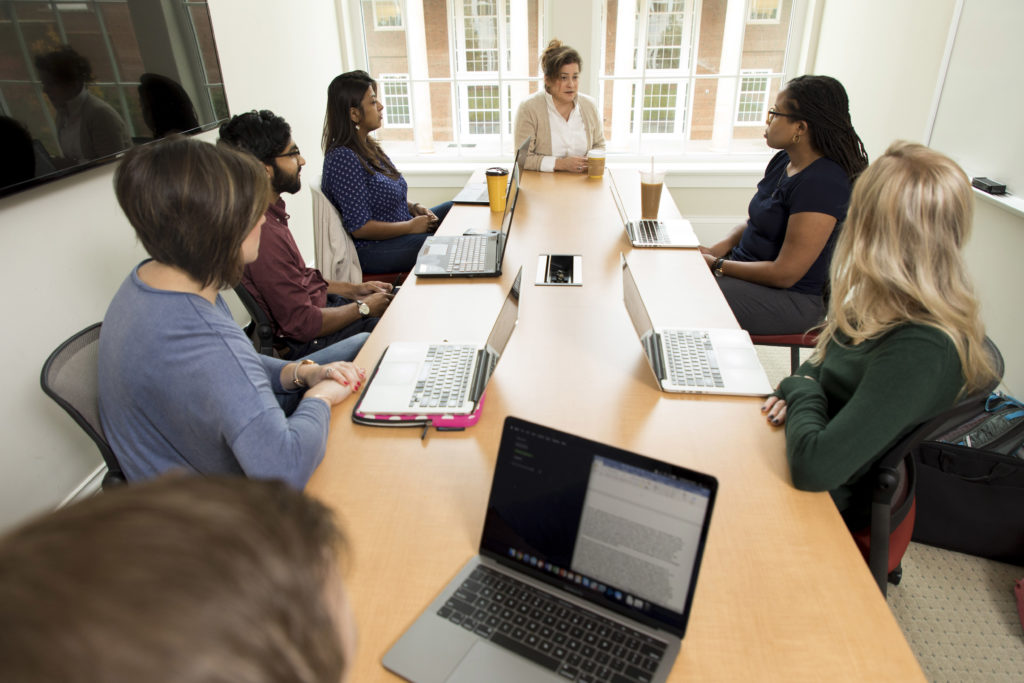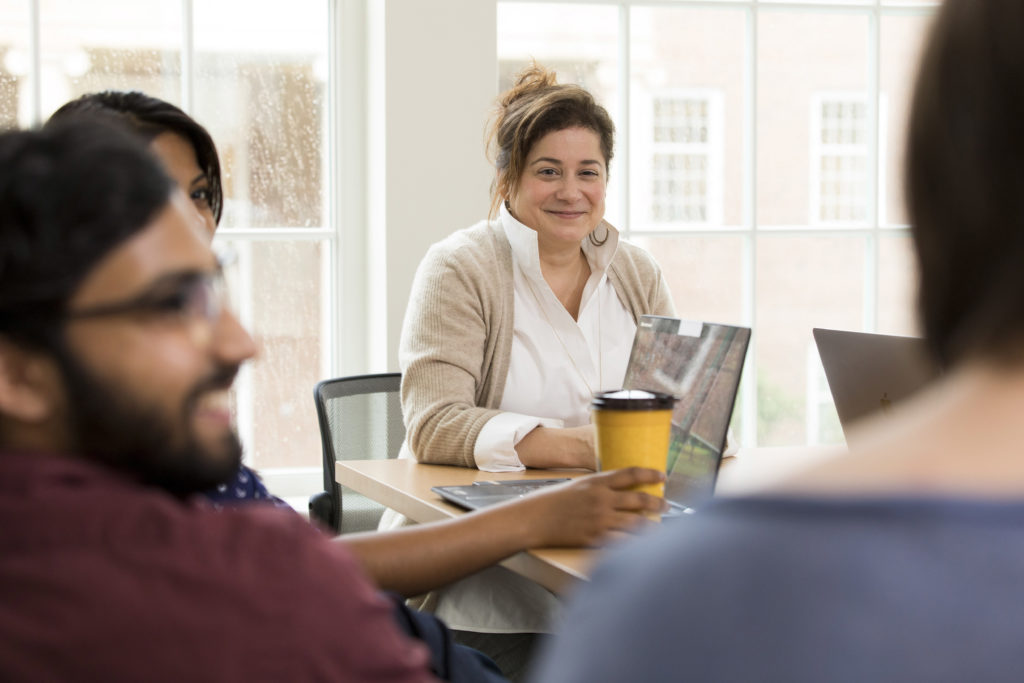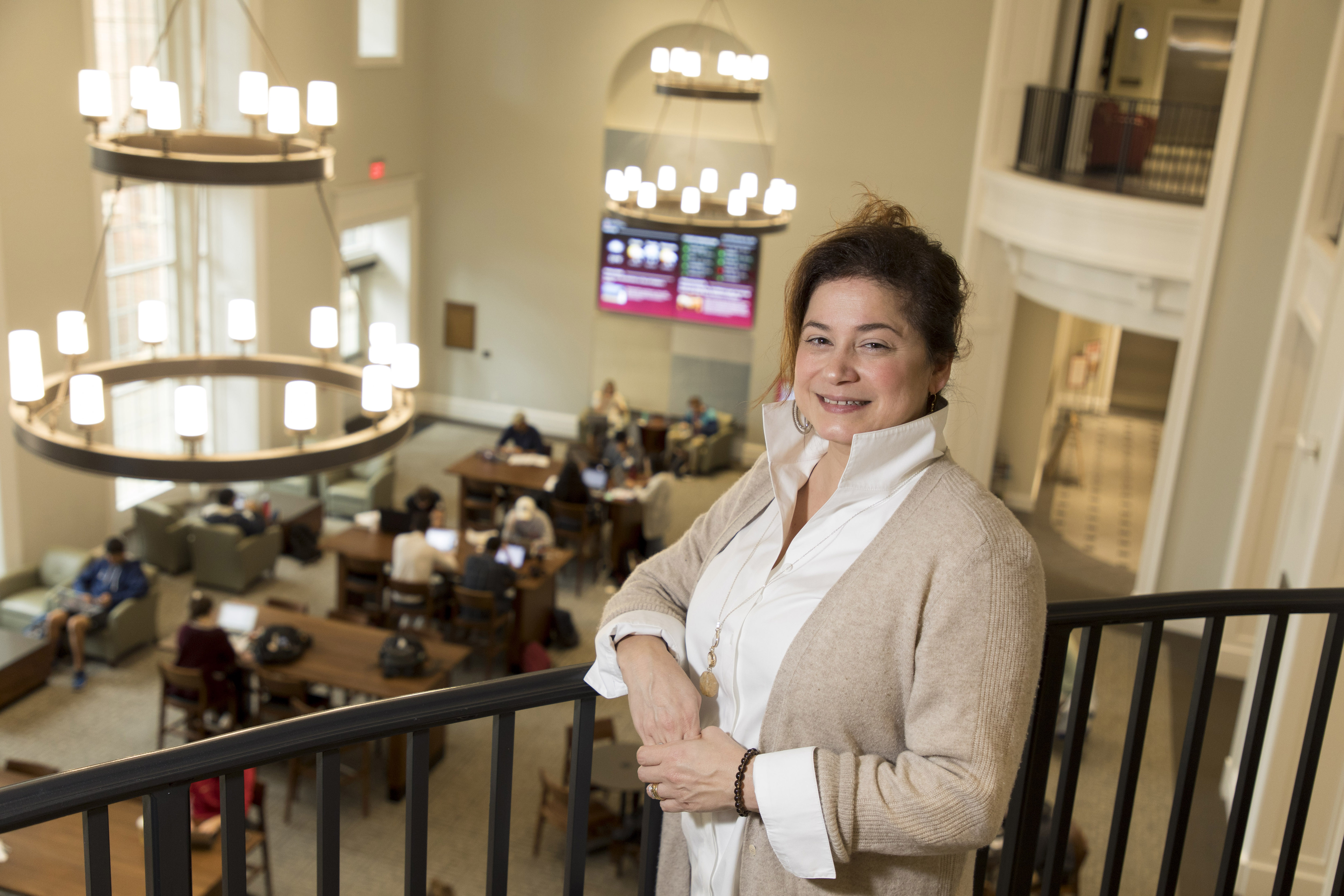Marie Mitchell, an associate professor in the Terry College of Business, conducts research that helps organizations promote functional, productive and ethical work behavior.
Where did you earn degrees and what are your current responsibilities at UGA?
I have a bachelor’s degree in political science, minoring in English literature, from George Mason University, a master’s degree in human resource management from Rollins College, and a Ph.D. in business administration, specializing in organizational behavior, from the University of Central Florida.
I teach a variety of management topics (e.g. negotiations, leadership and human resource management) at all levels—undergraduate, MBA (full-time, professionals and executives) as well as doctoral students. Beyond teaching, my research focuses on social and ethical issues within organizations, such as mistreatment and unethical behavior in the workplace. I work closely with students—mentoring scholarship, sitting on dissertation committees and advising Center for Undergraduate Research Opportunities projects. I also enjoy other service-oriented activities, such as being a member of the Terry College Diversity Advisory Council, and serving as the faculty advisor for the UGA Chapter of the Society for Human Resource Management.
When did you come to UGA and what brought you here?
I joined UGA in 2009 as an assistant professor, coming from the University of Nebraska. I was thrilled to join the Terry College of Business’ department of management, which is filled with smart, productive and friendly colleagues. It was clearly the right fit for me.
What are your favorite courses and why?
Negotiations is one of my favorite courses to teach. The material is immediately applicable to students, and it is fun to watch them develop over the semester. Many students have followed up with me, seeking advice on how to improve on topics like traversing job offers, organizational conflicts and career development. I also have had students send me updates on successes, negotiating more to their base salary or discussing win-win solutions at work. It makes me proud.
Teaching doctoral students is another favorite. My doctoral seminars emphasize theory and methods, and so we engage in lively conversations about how to evaluate published work and developing research ideas. It’s enormously satisfying when students bring their ideas to life in a research publication. Those types of teaching moments are enriching because they make a lasting impact on the students’ lives.

What are some highlights of your career at UGA?
I have had a number of highlights in my research, teaching and service. My research has contributed to strides in the management literature by demonstrating the implications of abusive supervision and the causes of unethical work behavior. There are many teaching high points—e.g., each time a student emails a success story, and publishing with Ph.D. students. Teaching recognitions are also meaningful. In 2017, I received the Terry College Outstanding Teacher Award and the Executive MBA Teacher of the Year Award. This year, I was selected to receive the Teaching Excellence Award for the Terry College. Lastly, there are many meaningful roles I have served for the university (e.g., Academic Honesty Panel), Terry College (e.g., Diversity Advisory Board, Special Certificate Programs), and my department (e.g., Society for Human Resource Management Faculty Advisor), as well as serving as an associate editor for the journal Personnel Psychology, where I shape scholarship for the organizational sciences.
How do you describe the scope and impact of your research or scholarship to people outside of your field?
My research appeals to outsiders because I study deviant, unethical and dark work behaviors. These behaviors can create a lot of dysfunction for organizations, their members and society more generally. As a recent example, I gave interviews on my research that explained why performance pressure motivates workplace cheating behavior. Interviewers understood the impact of the study, given high-profile examples (e.g., Wells Fargo employees opening fraudulent accounts, the Volkswagen emissions scandal). I also relay how costly these behaviors are and highlight how organizations can dissuade employees from engaging in these behaviors and how to promote functional, productive and ethical work behavior. Organizations and their employees can impact society because, when they act inappropriately, it can send a ripple across society that promotes new laws and regulations and a general sense of distrust in business. Accordingly, outsiders “get” the scope and need for what I study.
How does your research or scholarship inspire your teaching, and vice versa?
My research on workplace relationships feeds into my course material on cultivating relationships, leadership and performance management. Developing and maintaining strong work relationships are critical for heightening employee performance and effective work environments. My research on ethics is highlighted in every course I teach—ethics is a foundation by which all management topics should align. Likewise, the topics discussed in my courses enrich ideas for my research, fine-tuning the applicability of what I study to practitioners.
What do you hope students gain from their classroom experience with you?
I am very hopeful that students gain skills, knowledge and abilities that will enrich their lives.
Describe your ideal student.
The ideal student is curious, engaged, dedicated and coachable. Students who approach their studies with zest and ask critical questions set a high bar in the classroom. However, coachability—the ability to learn and develop—also is needed for success. Being able to identify what works and what can be improved upon is critical for a student to grow and for them to pay it forward by developing others.
Favorite place to be/thing to do on campus is…
One of my favorite things to do is walk through campus, particularly during the fall. Campus is beautiful. Watching the students hustle to class, play with their dogs, study on the lawn and engage with one another is fun.

Beyond the UGA campus, I like to…
I love spending time with my family, and enjoy traveling and cooking.
Community/civic involvement includes….
I am actively involved in the academic community outside of UGA, sitting on journal editorial boards, being associate editor at Personnel Psychology and serving in a variety of roles for the Academy of Management. I also give time to the overall UGA community by guest speaking as an ethics expert or providing job negotiation workshops to student groups.
Favorite book/movie (and why)?
As an undergraduate minor in English literature, one book had a lasting impact: “The Wide Sargasso Sea” by Jean Rhys. This book explains how the crazy wife ends up in the attic in Charlotte Bronte’s novel, “Jane Eyre” (which I also love). There are two key learning moments from it. First, the book provides a cautionary tale of getting caught up in pressures from society and of relationships that can impair a person’s development and freedom. Second, I had to write a paper about this book, comparing it to another. I can’t even remember the name of the other book, and that stood out in my analyses, forcing my teacher to ask me to redo my paper. What sticks with me from that experience is that when you are passionate about something, it shows. Be passionate and interested in what you do.
The one UGA experience I will always remember will be…
I have had many memorable experiences at UGA. In participating in various graduations, though, I truly enjoyed hearing Alton Brown speak. He was entertaining and funny, while also relaying good takeaways for students.
Is there anything else you’d like to add? (Other pertinent information to share)
I’m a mom of two—both are UGA students—and a wife of my supportive and loving husband, Chad. Our family also includes our two dogs, who keep us smiling.


